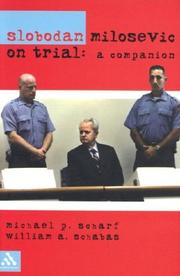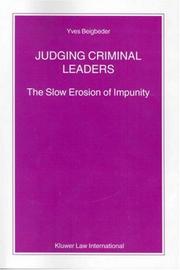| Listing 1 - 10 of 1304 | << page >> |
Sort by
|
Book
ISBN: 2847881506 9782847881509 Year: 2009 Publisher: Paris: École normale supérieure,
Abstract | Keywords | Export | Availability | Bookmark
 Loading...
Loading...Choose an application
- Reference Manager
- EndNote
- RefWorks (Direct export to RefWorks)
Le procès Barbie, qui se tint du 11 mai au 4 Juillet 1987 devant la cour d'assises du Rhône, fut le premier procès en France à invoquer le crime contre l'humanité. À l'occasion du vingtième anniversaire, le Centre d'histoire de la résistance et de la déportation, la Chaire lyonnaise des droits de l'homme, l'École normale supérieure Lettres et sciences humaines et la Maison d'Izieu, mémorial des enfants juifs exterminés, ont lancé une réflexion sur la situation actuelle en France et dans le monde ainsi que sur les réponses que peuvent apporter les juridictions nationales et internationales. Cette rencontre retrace la genèse et l'évolution de la notion de crime contre l'humanité, du génocide arménien aux juridictions rwandaises gacaca, nous invitant ainsi à une réflexion sur les enjeux politiques, juridiques et mémoriels de ces procédures. Entre justice punitive, volonté de responsabiliser, résistance à la négation et nécessité de la reconstruction, quels sont le rôle et la place des juges? Comment s'articulent justice pénale internationale et souverainetés? Et enfin, quel avenir pour la Cour pénale internationale?
Book
ISBN: 2271122368 9782271122360 Year: 2018 Publisher: Paris: CNRS,
Abstract | Keywords | Export | Availability | Bookmark
 Loading...
Loading...Choose an application
- Reference Manager
- EndNote
- RefWorks (Direct export to RefWorks)
"Installée le 18 octobre 2016, la Mission ministérielle d'étude en France sur la recherche et l'enseignement des génocides et des crimes de masse a remis au gouvernement un rapport de 1 700 pages dont la synthèse générale est publiée ici. Une équipe internationale de soixante-cinq chercheurs et professeurs a travaillé durant deux années pour établir un large bilan des savoirs sur les violences extrêmes, leur étendue dans le temps et leurs univers de destruction, entraînant l'anéantissement de populations entières, révélant la puissance exterminatrice d'États et d'idéologies. Cette enquête sans équivalent atteste des connaissances élaborées depuis plus de vingt ans, depuis que le génocide des Tutsi du Rwanda a démontré que la Shoah ne serait plus la dernière catastrophe et qu'il convenait alors d'intensifier toutes les recherches. Celles-ci sont capables aujourd'hui de fonder des progrès convergents, tant dans l'enseignement et l'éducation que dans la muséographie et la documentation. Ces nouvelles connaissances s'appliquent à penser les univers de la mise à mort de masse, la résistance et le témoignage des victimes, le choix des justes comme la logique des bourreaux, les "avant" et les "après" qui redéfinissent les processus génocidaires, la politique des nations et le défi du droit, la volonté de déshumanisation et le devoir d'humanité. De telles avancées heuristiques appellent des politiques de soutien. Sur la base de ses travaux, la Mission présente au gouvernement d'importantes recommandations pour doter nos sociétés des savoirs nécessaires à l'engagement contre les génocides, les crimes de masse, les violences extrêmes et les esclavages"

ISBN: 0826414117 Year: 2002 Publisher: New York (N.Y.) : Continuum,
Abstract | Keywords | Export | Availability | Bookmark
 Loading...
Loading...Choose an application
- Reference Manager
- EndNote
- RefWorks (Direct export to RefWorks)
Book
Year: 2016 Publisher: Toulouse (33 avenue Marcel Dassault 31500) : Érès,
Abstract | Keywords | Export | Availability | Bookmark
 Loading...
Loading...Choose an application
- Reference Manager
- EndNote
- RefWorks (Direct export to RefWorks)
Les enfants exposés aux violences collectives ont été confrontés à des traumatismes individuels, familiaux et/ou groupaux qui fragilisent leur développement. La perte des enveloppes culturelles et/ou familiales peut alors générer la « crainte de l'effondrement » psychique de ces enfants en mettant à mal leur continuité d'existence. A partir de cinq histoires collectives – la Shoah, la colonisation franco-algérienne, les familles tamoules exilées en France, le génocide au Rwanda et les violences de l'histoire d'Haïti – cet ouvrage analyse l'impact des violences collectives sur les enfants (bébés, enfants et adolescents) et leur construction subjective. A l'articulation de l'individuel et du collectif, de la psychanalyse, de l'histoire et de l'anthropologie, les auteurs apportent un éclairage sur les ébranlements du processus de développement. Ils proposent des analyses étayées sur des observations fines menées dans différents contextes et dessinent des pistes pour penser les modalités de soins.
Book
ISBN: 9780429492464 9781138588158 1138588156 Year: 2021 Publisher: London: Routledge,
Abstract | Keywords | Export | Availability | Bookmark
 Loading...
Loading...Choose an application
- Reference Manager
- EndNote
- RefWorks (Direct export to RefWorks)
"A defining and tragic feature of recent history, as seen in the Holocaust, ethnic cleansing, civil wars and the systematic persecution of certain racial and ethnic groups, is the attempt to deny and strip human beings of their humanity, where human beings are regarded and treated as inhuman or subhuman. Yet the very nature of dehumanization remains relatively poorly understood. The Routledge Handbook of Dehumanization is the first comprehensive reference source on the subject and an outstanding survey of the key concepts, issues and debates within dehumanization. Organized into four clear parts, the Handbook covers the following key topics: The history of humanization and dehumanization from the Enlightenment to the Twentieth century Victims of dehumanization: including genocide, race, disability, gender and immigration Ethical and legal aspects of dehumanization: including crimes against humanity, discrimination, hate speech, speciesism, and animal ethics; Conceptual and epistemological aspects: essentialism, measurement, the emotions and the future of dehumanization studies. Essential reading for students and researchers in ethics, political philosophy and moral psychology this Handbook will also be of interest to those in related disciplines such as politics, international relations, social psychology and race and ethnic studies, as well as anyone studying the nature of genocide and crimes against humanity"--
Book
ISBN: 1442635274 1442635282 Year: 2018 Publisher: Toronto, [Ontario, Canada] : University of Toronto Press,
Abstract | Keywords | Export | Availability | Bookmark
 Loading...
Loading...Choose an application
- Reference Manager
- EndNote
- RefWorks (Direct export to RefWorks)
These original essays show how the US government repeatedly aided certain regimes as they planned and then carried out crimes against humanity and genocide. What makes the collection unique—and chilling—is the inclusion of declassified documents generated by the US government at the time: memoranda, telegrams, letters, talking points, cables, discussion papers, and situation reports. In his introduction, Totten offers a critical assessment of US foreign policy as it pertains to genocide and crimes against humanity, and discusses the differences between those two terms. In the chapters that follow, each author presents a detailed analysis of a particular case of crimes against humanity or genocide by a foreign government against its own citizens, and discusses why and how the United States government was complicit.
Book
ISBN: 2841741591 9782841741595 Year: 2000 Volume: *6 Publisher: Paris : Editions Kimé,
Abstract | Keywords | Export | Availability | Bookmark
 Loading...
Loading...Choose an application
- Reference Manager
- EndNote
- RefWorks (Direct export to RefWorks)
Ethics --- Ethiek --- Ethique --- Crimes against humanity --- Crimes against humanity. --- Ethics.
Book
ISBN: 9781849711463 1849711461 Year: 2010 Publisher: London: Earthscan,
Abstract | Keywords | Export | Availability | Bookmark
 Loading...
Loading...Choose an application
- Reference Manager
- EndNote
- RefWorks (Direct export to RefWorks)
Crimes against humanity. --- Human rights. --- Crimes against humanity --- Human Rights
Book
ISBN: 1412808278 9781412808279 Year: 2009 Publisher: New Brunswick: Transaction,
Abstract | Keywords | Export | Availability | Bookmark
 Loading...
Loading...Choose an application
- Reference Manager
- EndNote
- RefWorks (Direct export to RefWorks)
The plight and fate of female victims during the course of genocide is radically and profoundly different from their male counterparts. Like males, female victims suffer demonization, ostracism, discrimination, and deprivation of their basic human rights. They are often rounded up, deported, and killed. But, unlike most men, women are subjected to rape, gang rape, and mass rape. Such assaults and degradation can, and often do, result in horrible injuries to their reproductive systems and unwanted pregnancies. This volume takes one stride towards assessing these grievances, and argues against policies calculated to continue such indifference to great human suffering. The horror and pain suffered by females does not end with the act of rape. There is always the fear, and reality, of being infected with HIV/AIDS. Concomitantly, there is the possibility of becoming pregnant.Then, there is the birth of the babies. For some, the very sight of the babies and children reminds mothers of the horrific violations they suffered. When mothers harbor deep-seated hatred or distain for such children, it results in more misery. The hatred may be so great that children born of rape leave home early in order to fend for themselves on the street. This seventh volume in the Genocide series will provoke debate, discussion, reflection and, ultimately, action. The issues presented include ongoing mass rape of girls and women during periods of war and genocide, ostracism of female victims, terrible psychological and physical wounds, the plight of offspring resulting from rapes, and the critical need for medical and psychological services.
Genocide --- Women --- Crimes against humanity --- Crimes against humanity

ISBN: 9789004480070 9789041118158 Year: 2002 Publisher: Leiden; Boston : Brill | Nijhoff
Abstract | Keywords | Export | Availability | Bookmark
 Loading...
Loading...Choose an application
- Reference Manager
- EndNote
- RefWorks (Direct export to RefWorks)
In spite of the Geneva and The Hague Conventions of the late 19th century, the Twentieth Century has been a century of massacres and genocides: the massacres due to European colonialism, two World Wars, the Holocaust, the Armenian and the Rwanda genocides, the casualties caused by the Communist utopia in the USSR, China and Cambodia, and numerous civil wars. Most of the leaders mainly responsible for these massacres and genocides have enjoyed impunity. However, there is a slow popular awakening to the fact that leaders should be accountable for their crimes. A human rights regime was created after World War II, international criminal law has taken root with the Nuremberg and Tokyo Tribunals, and, in the 1990's with the International Criminal Tribunals for the Former Yugoslavia and for Rwanda. In 1998, the Statute for an International Criminal Court was adopted, while the arrest of former dictator Pinochet in London has created both a political storm and a judiciary advance. The "Princeton Principles on Universal Jurisdiction" have been publicized in an effort to strengthen the application of international law in national legal systems. In Cambodia and Sierra Leone, mixed national/international courts are being set up to try criminal leaders. This unique volume offers the reader an overview of the various models which are emerging to ensure that criminal leaders and their collaborators are made accountable for their schemes and actions, and clearly illustrates how national, international and mixed national/international tribunals are slowly eroding the impunity of criminal leaders.
| Listing 1 - 10 of 1304 | << page >> |
Sort by
|

 Search
Search Feedback
Feedback About UniCat
About UniCat  Help
Help News
News